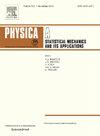考虑节点异质性的供应链网络风险传播
IF 2.8
3区 物理与天体物理
Q2 PHYSICS, MULTIDISCIPLINARY
Physica A: Statistical Mechanics and its Applications
Pub Date : 2024-11-22
DOI:10.1016/j.physa.2024.130236
引用次数: 0
摘要
在当前高度互联的全球经济中,供应链网络内的风险传播因其深远影响而备受研究人员关注。鉴于供应链中不同企业的风险传播能力各不相同,我们提出了一种考虑节点间异质性的风险传播模型,即度依赖风险传播(DDRP)模型。我们分析了不同异质性参数对供应链网络中风险传播性能的影响,并进一步探讨了这些影响如何影响供应链网络中的物流效率。结果表明,节点间的异质性大大增加了供应链网络的脆弱性,使其在面对风险传播时效率降低。在高度异构的网络中,更多的节点会受到感染,导致物流运输效率明显下降,严重破坏了整个供应链的正常运作。我们的研究不仅为供应链网络中的风险传播提供了一个新颖的理论模型,还为管理者和决策者提供了宝贵的实践启示。通过识别和理解异质性对风险传播的影响,决策者可以制定更有效的风险管理策略,从而提高供应链的弹性和效率。本文章由计算机程序翻译,如有差异,请以英文原文为准。
Risk propagation in supply-chain network considering node heterogeneity
In the current highly interconnected global economy, risk propagation within supply-chain networks has drawn significant attention from researchers because of its profound impact. Given the varying risk-propagation capabilities of different firms within the supply chain, we propose a risk-propagation model that considers the heterogeneity between nodes, referred to as the Degree-Dependent Risk Propagation (DDRP) model. We analyze the effects of different heterogeneity parameters on the performance of risk propagation in the supply-chain network and further explore how these effects influence the efficiency of logistics within the supply-chain network. The results indicate that the heterogeneity between nodes significantly increases the vulnerability of the supply-chain network, making it less efficient when facing risk propagation. In a highly heterogeneous network, more nodes become infected, leading to a notable decline in logistics-transportation efficiency, which severely disrupts the normal functioning of the entire supply chain. Our research not only provides a novel theoretical model for risk propagation in supply-chain networks, but also offers valuable practical insights for managers and decision-makers. By identifying and understanding the influence of heterogeneity on risk propagation, decision-makers can formulate more effective risk-management strategies, thereby enhancing supply-chain resilience and efficiency.
求助全文
通过发布文献求助,成功后即可免费获取论文全文。
去求助
来源期刊
CiteScore
7.20
自引率
9.10%
发文量
852
审稿时长
6.6 months
期刊介绍:
Physica A: Statistical Mechanics and its Applications
Recognized by the European Physical Society
Physica A publishes research in the field of statistical mechanics and its applications.
Statistical mechanics sets out to explain the behaviour of macroscopic systems by studying the statistical properties of their microscopic constituents.
Applications of the techniques of statistical mechanics are widespread, and include: applications to physical systems such as solids, liquids and gases; applications to chemical and biological systems (colloids, interfaces, complex fluids, polymers and biopolymers, cell physics); and other interdisciplinary applications to for instance biological, economical and sociological systems.

 求助内容:
求助内容: 应助结果提醒方式:
应助结果提醒方式:


